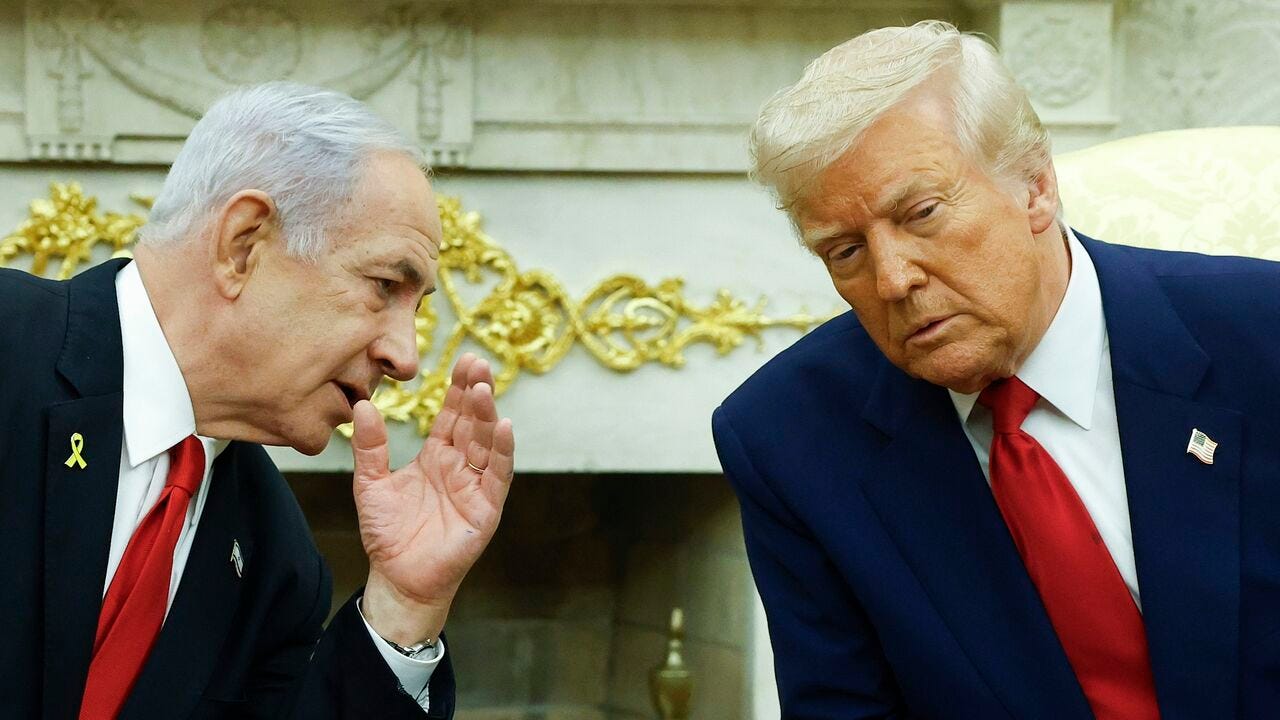Trump’s Red Line: A Genuine Stand or Diplomatic Theater Against Netanyahu?
In a striking departure from his historically unwavering support for Israel, President Donald Trump declared on September 25, 2025, that he “will not allow” Israel to annex the occupied West Bank, drawing a firm boundary around one of the most contentious issues in the Israeli-Palestinian conflict.
Speaking to reporters in the Oval Office, Trump stated bluntly, “I will not allow Israel to annex the West Bank. Nope. I will not allow it. It’s not going to happen.” He added that he’d discussed the matter directly with Israeli Prime Minister Benjamin Netanyahu earlier that day, emphasizing, “There’s been enough. It’s time to stop now.”
This comes amid escalating tensions, as Netanyahu’s far-right coalition partners have pushed for annexation in retaliation for several Western nations— including Britain, Canada, France, and Portugal—recognizing Palestinian statehood in recent weeks.
The West Bank, captured by Israel from Jordan during the 1967 Six-Day War, remains a flashpoint for peace efforts. Annexation would formalize Israeli sovereignty over large swaths of the territory, effectively burying prospects for a two-state solution and incorporating millions of Palestinians under Israeli control without full citizenship rights.
Trump’s intervention aligns with warnings from Arab allies, who have conditioned support for his broader Middle East peace initiatives on halting such moves. During a closed-door UN General Assembly meeting on September 24, Trump reportedly assured leaders from Saudi Arabia, the UAE, Qatar, Egypt, Jordan, Turkey, Indonesia, and Pakistan that he would block annexation to preserve the Abraham Accords—his signature diplomatic achievement from his first term. Saudi Foreign Minister Prince Faisal bin Farhan Al Saud later noted that Trump “understands very well” the risks, including the potential collapse of these normalization deals.
Yet, this public foot-stomping raises questions: Is Trump truly prepared to exert leverage over Netanyahu, or is it a calculated facade to appease international pressure? On the surface, the rhetoric signals a shift. Trump’s administration has presented a 21-point peace plan for Gaza, which includes Israeli withdrawal from the enclave and governance without Hamas, but explicitly rejects West Bank annexation.
Special Envoy Steve Witkoff, speaking at the Concordia Summit in New York, highlighted how the plan addresses “Israeli concerns and... the concerns of all the neighbors,” underscoring a balanced approach. French President Emmanuel Macron echoed this, telling media that Trump agreed West Bank settlements are “counterproductive” and unrelated to Hamas threats.
But beneath the assurances, skeptics point to deeper dynamics that could undermine Trump’s resolve. Reports suggest Netanyahu has been leveraging his influence in ways that challenge the notion of U.S. dominance. During his recent travel to Europe—marked by circuitous flight paths to evade ICC arrest warrants for alleged war crimes in Gaza—Netanyahu reportedly boasted to European leaders that he “owns America” and specifically “owns Donald Trump.”
These claims, first amplified by Tucker Carlson in a September 2025 interview, portray Netanyahu as the puppeteer, using off-the-record conversations to project unassailable control. Carlson alleged that Netanyahu has been “running around” the Middle East and Europe, flaunting his sway over U.S. policy to deter criticism. Israeli media and X posts have fueled this narrative, with users like @YairNetanyahu dismissing it as “Qatari propaganda,” but the whispers persist, especially amid Netanyahu’s meetings with U.S. influencers to bolster pro-Israel sentiment on platforms like TikTok and X.
This bravado isn’t without foundation. Netanyahu’s ultranationalist government has expanded settlements in the West Bank by over 16% in the past year, the highest rate since 2006, according to UN data. Far-right ministers like Itamar Ben-Gvir have demanded immediate annexation, framing it as a response to Palestinian state recognitions.
Trump’s own appointees, such as Ambassador to Israel Mike Huckabee—a vocal advocate for “Greater Israel”—have downplayed U.S. opposition, telling Israeli outlets that America has “never asked Israel not to apply sovereignty.” Critics argue this reflects a pro-Israel bias within Trump’s inner circle, including son-in-law Jared Kushner, whose family foundation has donated millions to West Bank settlements.
Compounding the tension is speculation of coercion. Long-standing rumors tie Trump to Jeffrey Epstein’s network, with unverified claims that Israeli intelligence—via Mossad—holds compromising material on the president. While unsubstantiated, these whispers have gained traction on X, where users like @ShaykhSulaiman and @DeepBlueCrypto decry Trump as “Netanyahu’s bitch,” citing his reluctance to criticize Israel’s Gaza operations despite over 65,000 Palestinian deaths.
Trump’s frustration with Netanyahu is palpable: Wall Street Journal reports detail heated calls where the president fumed, “He’s f—ing me,” after Israeli strikes targeted Hamas negotiators in Qatar, derailing cease-fire talks. Yet, actions speak louder—Trump’s administration sanctioned the ICC to shield Netanyahu from prosecution and greenlit U.S. strikes on Iranian nuclear sites, aiding Israel’s regional ambitions.
If blackmail or bureaucratic entrenchment is at play, Trump’s “red line” may prove illusory. Israel’s de facto control over the West Bank—through military presence, settlement expansion, and resource extraction—already mimics annexation, rendering formal steps somewhat academic, as Al Jazeera analyst Bassam Elmasry noted.
Netanyahu’s coalition depends on hardliners who view concessions as existential threats; yielding could topple his government. Trump, eyeing legacy-defining peace deals, risks isolation if he pushes too hard—his administration is already criticized for defending Israel’s Gaza campaign, labeled “genocide” by a UN inquiry.
Ultimately, Trump’s West Bank stance could be a verbal pushback to reclaim narrative control after Netanyahu’s alleged boasts, signaling to allies that America, not Israel, calls the shots. But without concrete enforcement—like withholding the $3.8 billion in annual aid—it’s theater. As Netanyahu arrives in Washington for a September 30 meeting, the world watches: Will Trump put his foot down, or will old alliances prevail? In a conflict where words often outpace deeds, the true test lies not in Oval Office declarations, but in the settlements that continue to rise.


